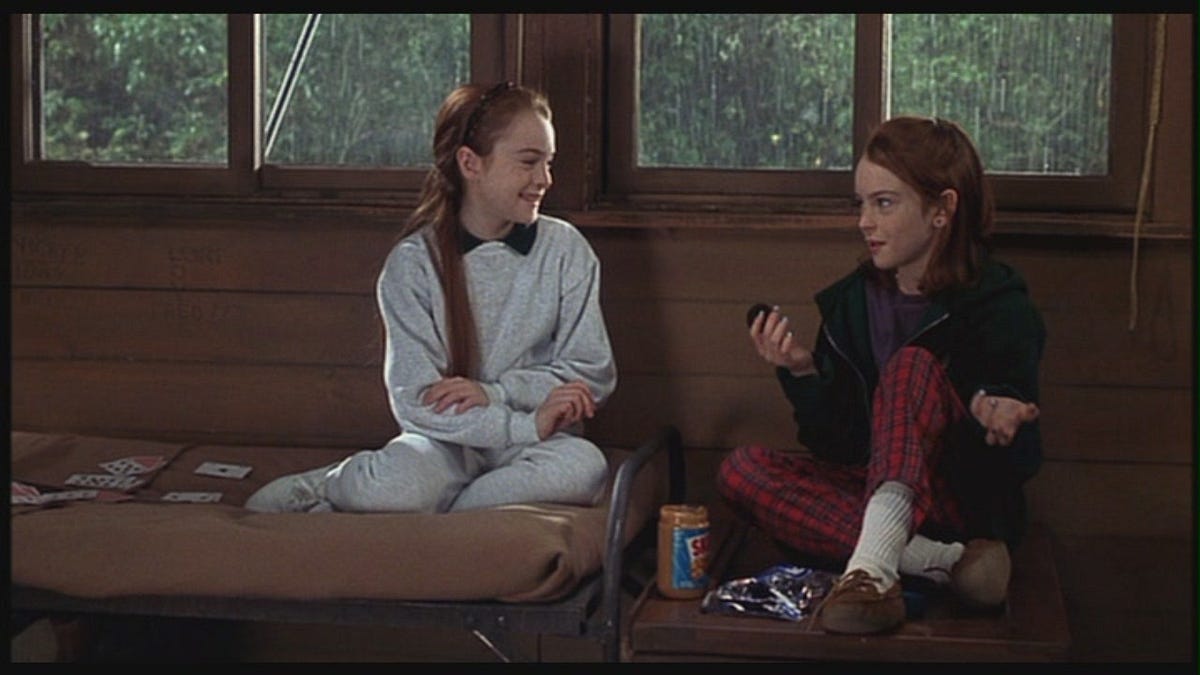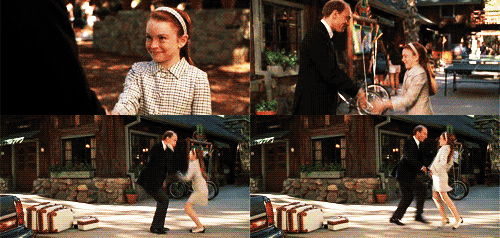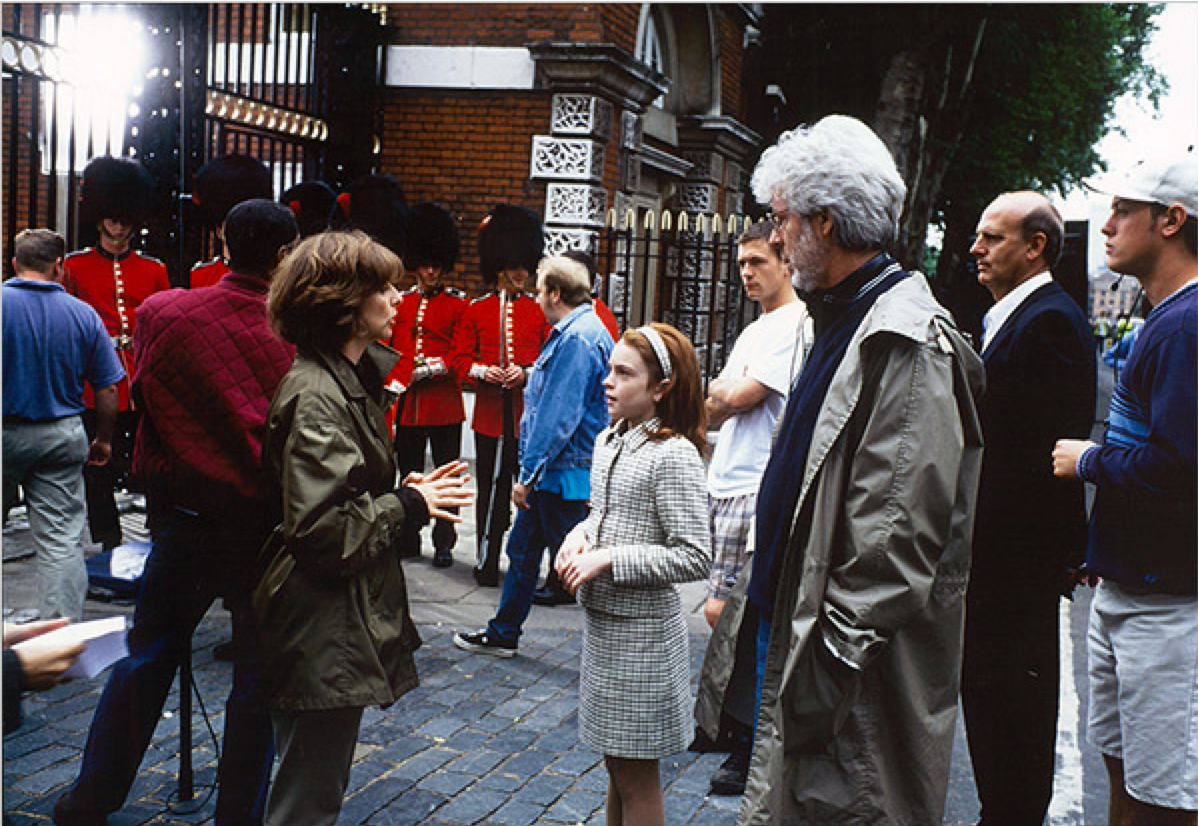 |
Lindsay Lohan as Annie and Hallie in The Parent Trap DISNEY PICTURES
|
The Lindsay Lohan-starring nostalgic cult classic and proto-feminist masterpiece is ready for rediscovery.
This year marks the 18th anniversary of the release of the film The Parent Trap, the story of identical twin girls separated at birth who meet by chance, switch places and scheme to reunite their parents. Like many of that era’s most entertaining films it’s more Shakespeare farce than ‘serious cinema’, yet, investigating it as such reveals one of the most unjustly ignored movies of recent decades.
Despite the film’s the box office success and a warm reception from the Queen at a Royal Screening, The Parent Trap has all the features of a cult classic.
The film boasts strong, lovingly drawn characters inhabiting a richly-detailed world in a smartly-paced story that stars actors on the top of their game. In an age of children’s movies featuring lightning-fast edits, a bombardment of focus-group tested cross-cultural slapstick and sly adult references, The Parent Trap is a stronger film than ever.
Husband and wife team of producer Charles Shyer and director Nancy Meyers were still fresh from the massive success of Father of the Bride and its sequel when they chose to remake Disney’s 1961 classic The Parent Trap. Even among supporters and detractors of Meyers, The Parent Trap is rarely discussed. Its many millions of fans share their affection for it among friends and siblings. It’s loved, but not openly. As a sign of how this is changing as its fans are aging, Shyer signed three Parent Trap posters hours before our interview. “It’s getting to be a regular thing,” he admitted.
Like all cult films, there is a subversive edge. The Parent Trap is a proto-feminist tale so sweetly and satisfyingly told that even its conservative fans don’t notice.
“It would never occur to us to make a film that did anything but empower young girls or young women,” said Shyer as if considering the film in this light for the first time. “We just thought of it as a cool story.”
 |
Annie and Hailee deduce they’re sisters at Camp Walden. DISNEY PICTURES
|
The ‘cult’ with whom it is classic is that most devalued and belittled of viewers, young girls, an often-misunderstood and frequently ignored audience rarely catered for by movie studios looking for a safe bet.
Younger girls are typically catered for directly by the hyper-materialistic glitz of formulaic series such as The Princess Diaries and the output of the Olsen twins. Age up slightly, and you have the coming-of-age riches of Mean Girls, Clueless, The Hairy Bird and Bring It On. While the girls in these films have escapist fun in modern settings, none of these settings are as meticulously imagined as Meyers’, no story is as satisfying as The Parent Trap’s tried and true screenplay, or role as demanding as Lindsay Lohan’s dual-performance as twins Annie and Hallie.
The term ‘family film’ typically refers to boy-starring fare such as E.T., Stand by Me, Jumanji, Son of Rambo and the early Harry Potter movies. While they’re rightfully cherished, Hollywood clearly sees boys as a more lucrative target market with girls expected to bond with secondary characters — sisters, sidekicks and comic relief.
Shyer and Meyers’ cast the almost unknown actress in a role that saw her play opposite herself with the aid of a double and careful editing.
“It’s an extraordinarily Greek situation really,” says Kunz laughing. “You have a pair of twins and you don’t tell them about each other! It’s a hell of a premise. It’s a really old kind of story, it’s like Oedipus being taken as a child.”
“Lindsay was quite brilliant in the movie, there’s no doubt about it,” says Shyer.
Simon Kunz, who played English butler Martin, agrees. “She was 11 when we shot the series, but she’d been lurking in some sort of family TV series [Another World] since she was eight so she was seasoned in a way. One is used to seeing precocious American kids like Drew Barrymore on screen. When American actors get it right they have this amazing, relaxed sense of quality. She was cracking wise the whole time and full of energy.”
 |
| Lindsay Lohan, Lindsay Lohan and some photographic trickery. DISNEY PICTURES |
Few live action films targeting young girls are worthy of being watched
by anyone other than their intended audience. Fewer still hold up to
scrutiny in this hypercritical era, and almost none focus on the power
of young girls to effect lasting change in the world of career-oriented
adults.
Lohan’s likeability is a key reason why this film works today. The Parent Trap is not only a modern fairy-tale, but it’s one that has a very clear idea of — to paraphrase Meyers’ biggest box office success — what (young) women want. The English Annie lives with her mother Elizabeth, in a version of London that can only exist in works of fiction such as Mary Poppins or Made in Chelsea. “Elizabeth has a pretty good life,” the late Natasha Richardson said of her character. “I’m English, so of course I have a butler! I also happen to be a designer of wedding gowns and I can’t think of anything more romantic and feminine than that.”
American twin sister Hallie lives in a sprawling Spanish colonial mansion in Napa Valley with her adoring winemaker father [Dennis Quaid] and loving nanny Chessy played by Lisa Ann Walter. They’re perfect settings from which to begin a tale of happy people seeking the only thing keeping them from perfection. At no stage is anyone’s welfare is threatened and only Elaine Hendrix’s gold-digger temptress Meredith has nefarious intentions.
‘Hang on,’ thinks everyone over the age of eight, ‘what sort of mother would abandon a daughter and not tell the other about her father or identical sister?’
Shyer demurs. “The big problem was how do you justify a couple saying ‘I’ll take one, you take the other?’ It’s a fucking weird decision to make! We rationalised it to some extent and it worked, but I have nine year-old twins, a boy and a girl, and it’s unthinkable!”
Richardson said of her role as the girls’ mother, “I think Elizabeth has felt that she had this terrible secret locked inside her. A piece of her that’s never there because she has this other daughter who isn’t with her.”
 |
Dennis Quaid, Natasha Richardson and Lindsay Lohan DISNEY PICTURES
|
Rather than responding with a justifiable fury that leads to substance abuse, detox, occasional relapses, years of counselling and a lifelong need for affirmation, Hallie and Annie are overjoyed to discover that they can meet an estranged parent. As their plan unfolds, viewers join the two Lohans in their safe but unfamiliar environments aligned as co-conspirators in a situation every kid adores: knowing something an adult doesn’t.
This is one of the masterstrokes of the original text, Lottie and Lisa, a German children’s story by Erich Kästner first published in 1931. At its heart is the story of two children plan to engineer the very thing that seems the epitome of disgusting — a romantic attraction between their parents. Each girl recognises the others desire to meet a parent they don’t know and “making mom and dad fall in love” is the only way to maintain the connection with the new parent. Like most classic fairy-tales and Shakespeare comedies, the premise is ridiculous and the ending predictable, yet the story is so simple, the structure so elegant and its world so gracefully constructed that it feels like a well-worn classic. Like the 1998 version, the 1961 film adaptation starring Hayley Mills was a tale told without cynicism, no concessions to an adult audience, and almost entirely without boys.
Much as Back to the Future is celebrated as a nostalgic cult classic, The Parent Trap can now be seen as evocative of a pre-adolescent era. As 15 year-old contributor Chana B wrote at Teenink: “When I think of The Parent Trap, I just feel very, very lucky for being among those privileged enough to grow up with this movie and to really experience the joys of childhood.”
Film critic Anders Furze credits The Parent Trap with helping him realise his sexuality. “As a young gay boy in a country Australian town, The Parent Trap helped me realise that if I wasn’t gay, then I was at least different. At the age of eight I longed to be a fusion of both Lindsay Lohans: to have the hip pop culture smarts of Hallie and blend them with Annie’s mannered sophistication. Revisiting it I was struck by how much it offers a gay audience: Elaine Hendricks’ gloriously camp performance as “Ice Queen” Meredith aside, when Annie nervously reveals that she isn’t Hallie, Chessy’s emotional, sympathetic response is the stuff every queer kid’s coming out fantasy is made of.”
 |
| Hailee (Lindsay Lohan) hatches a plan. DISNEY PICTURES |
“These Christians…you know…” producer Charles Shyer sighs in exasperation. “You can’t control it. You get these accolades from Christian and religious groups and you go ‘OK, great, but that’s not what we were going for. We were going for a movie that made you laugh, made you cry and made you feel good.’”
Moralising reviewers overlook the fact that Richardson’s character built her successful business as a single mother, excelling in a way that would have been impossible were she married and raising children in California. She is a capable, instantly likeable woman who adores her daughter and the only man she needs in her life is a butler. “Mom is so cool!” Annie whispers to Hallie on one of their secret transatlantic phone calls. “Dad is the greatest!” she replies.
The Parent Trap still excels because it foregrounds the girls, gives them agency, brains, ingenuity, a sense of humour and one of the strongest motivators known to filmmakers: the reuniting of family. Quaid and Richardson were given the unenviable task of being instantly lovable without any chances to establish their characters beyond their relationship to their daughters, and later, to each other.
“With Natasha and Dennis and Lindsay and Simon [Kunz] and Lisa Ann Walter, those people were so fantastic, it really, really worked,” Shyer sighs. Man that was a good shoot. The chemistry was just wonderful. There was no tension at all. Natasha came after us for that role, she really wanted it. It was such a shame what happened with her,” he says of her fatal skiing accident in 2009. “She was such a wonderful, lovely woman.”
“I was very lucky,” says Kunz. “Lucky to be part of a film that gets watched again and again and becomes a favourite, and to have a few little moments that make people go ‘oh that! I remember that!’ It’s quite touching.”
The Handshake
 |
| The Parent Trap Handshake DISNEY PICTURES |
If any moment from The Parent Trap has left its mark in popular culture, it’s the distinctive handshake Lohan’s character Annie shares with her butler, Martin.
“The handshake is a big deal isn’t it?” says Shyer with a warm laugh. “It was in the script — we were all involved in writing it, but Simon [Kunz] and Lindsay worked it out on the set. They really hit it off those two, they made it their own. It was a really good idea.”
Should you need it broken down, several instructional videos exist, including the one above from the handshake’s ‘official choreographer’ Jeanefer Jean-Charles.
Meeting the Queen
 |
| L-R: Director Nancy Meyers, Lindsay Lohan and producer Charles Shyer shoot a deleted scene from The Parent Trap in which Hailee meets the Queen. DISNEY PICTURES |
“We were given a complete drill about what you can and can’t do. Don’t speak to her unless she speaks to you, don’t touch her, call her M’am all these things,” he laughs. “We sat right behind her during the screening, the Queen and the Prince [Phillip] and she had these little white gloves on. She’d clap and go ‘haugh haugh haugh’ during the screening it was a little bit like an out of body experience you know — ‘What am I doing here?’ Hayley Mills came too, and her father the brilliant actor John Mills [Great Expectations]. It was really special. Once in a lifetime.”
“The protocol when you do these screenings is that the people directly involved in making the film stand in the front line and their spouses stand behind them,” says Simon Kunz of his experience. “And Meg Ryan had come over, because she was with Dennis [Quaid] at the time. I’m sure she thought she was going to say hello to the Queen, and poor woman, she was stood behind Dennis in the lineup and I was next to him and the whole time I was imagining that Meg Ryan was standing there thinking “My God, I came all the way here for this!”